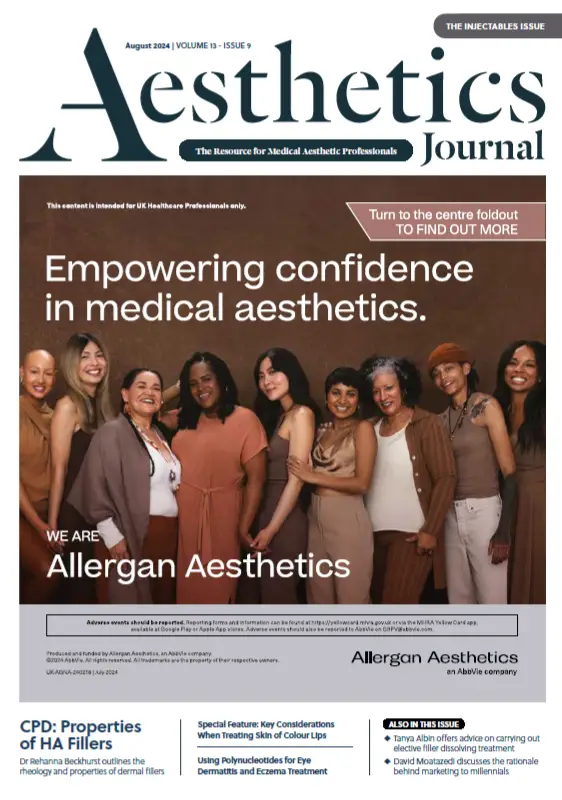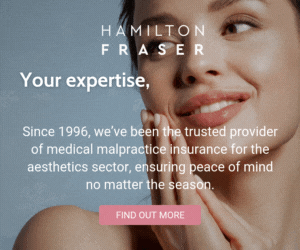Associations and other members within the aesthetics industry have been responding to a public consultation launched by the UK Government regarding a potential aesthetic medicine licensing scheme in England.
The consultation will seek the thoughts of practitioners and members of the public on how non-surgical aesthetics should be regulated in England. The proposed changes include introducing new licensing laws for any practitioner and premises offering treatments such as botulinum toxin, dermal fillers and chemical peels.
The government is suggesting that these treatments become RAG-rated (red, amber or green) depending on how invasive they are deemed to be. ‘Red’ treatments would be the most invasive and would require practitioners to be a doctor or be CQC-registered. ‘Amber’ treatments would include injectables, and may need to be performed under the supervision of a medical professional. ‘Green’ treatments refer to non-invasive procedures such as microneedling which will not require supervision.
The upcoming legislation is also set to make treating patients under 18 with the aforementioned procedures a criminal offence. The consultation will place emphasis on exemplary training in order to protect patient safety.
Chair of the Joint Council for Cosmetic Practitioners (JCCP) Professor David Sines has been working alongside the Government to advise on the proposed scheme. He said, “The recent explosion in cosmetic procedures has been fuelled by social media, the proliferation of high street beauty outlets and a dramatic increase in the range of cosmetic procedures. All these procedures carry the risk of serious harm if they are not administered by suitably trained professionals operating from clean and hygienic premises.”
He continued, “I warmly welcome the government’s decision to consult on this new, proposed licensing scheme. It will help to ensure that people who undergo non-surgical cosmetic procedures receive treatment from practitioners who are properly trained and qualified, have the necessary insurance cover and operate from premises that are safe and hygienic.”
The consultation will be open to members of the public as well as medical practitioners, meaning non-medical injectors, clinic staff and even patients are eligible to contribute their thoughts.
Maxine McCarthy, non-medical injector and representative of the Association of Cosmetic Practitioners Britain (ACPB), has commented, “This is not the end of non-medics – it’s the beginning of most non-medics being recognised as expert, competent and safe professionals. We really need experienced practitioners who are non-medics to be recognised for what they do as many have been in the industry for years and are vastly competent – many training and employing medics! The vast majority of treatments are really professionally administered, safe and give clients amazing results, and that needs to be reflected in the consultation by non-medics activating their extremely happy client base.”
She went on to say, “I’d propose a simple Supervision Matrix – with what ‘supervision’ you require depending on your experience and qualifications. For example, a non-medic with 10-years’-experience and a level 5 or 7 Ofqual regulated qualification would require way less supervision than someone with a year’s experience and only a level 3 qualification. Moreover, there are some treatments that carry a higher risk, and it’s good the Government has created a RAG traffic light system to recognise this, but I’d like to see non-medics with loads of experience offered a special course to be able to offer treatments in the red zone.”
Dr Catherine Fairris, president of the British College of Aesthetic Medicine (BCAM) confirmed in a joint statement with the British Association of Cosmetic Nurses (BACN) that she supports the new scheme. She said, “BCAM welcomes licensing, especially if it puts patient safety at the centre of its agenda by promoting the medical model of aesthetics. We want to work collaboratively with the BACN and the other main stake holders to ensure that this consultation achieves the most effectual licensing policy for aesthetics in the UK.”
Chair of the BACN Sharon Bennett added, “The BACN supports any move towards regulation which puts patient safety at the heart of its agenda. Together we will be working with BCAM and other stakeholders to ensure that any member of the public undergoing a medical aesthetic treatment is given the ‘reasonable standard of care’ as expected in any medical treatment.”
Ashton Collins, director at Save Face, also was eager to share her thoughts. She said Save Face is eager to contribute towards the proposal. “We have been engaging with the Department of Health and Social Care (DHSC) to contribute our thoughts and ideas ahead of the release of this public consultation. Being involved in the process has enabled Save Face to actively contribute to roundtable discussions with ministers, policy makers and key stakeholders. We look forward to continuing to work closely with the DHSC and key stakeholders during the next stages of the process,” she said.
Aesthetic practitioner Dr Sophie Shotter appeared on BBC News after the consultation was announced to discuss the topic. She told Aesthetics, “The launch of the public consultation is exciting, and something that we as healthcare practitioners should engage in and encourage our patients to engage in. It’s important we remember this is a consultation and is not yet a change in legislation – we have campaigned hard to reach this point, and now is our opportunity to put a strong message across to help promote patient safety moving forwards.”
Dr Tristan Mehta, founder of one the UK’s most prominent training providers in aesthetic medicine Harley Academy, showed his support for the new proposal. He said, “We are pleased to see the RAG-rating approach to non-surgical treatments, and restricting who can administer injectables, in particular. However, it’s crucial that we all feedback during this consultation about what we want terms such as ‘supervision’ to mean. At Harley Academy, we are keen to see the government’s stance on the minimum standard of aesthetics training and education that practitioners will require to obtain their licence, in the next phase of what appears to be an overhaul of the sector in England.”
The consultation period will be open until October 28, and opinions/expertise can be shared by clicking this link.
Aesthetics has contacted a non-medical practitioner association for comment and will be updating this developing story.









